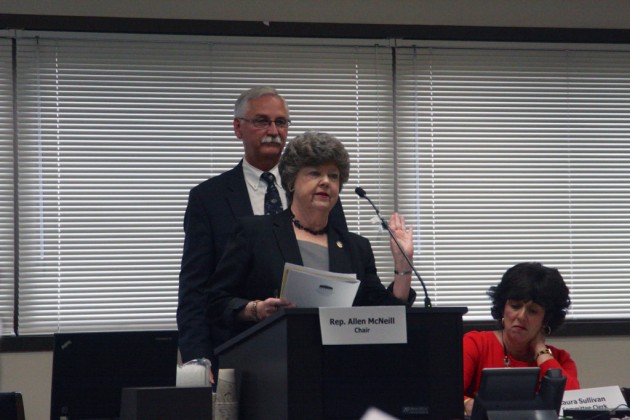Publisher's note: The author of this post is Dan Way, who is an associate editor for the Carolina Journal, John Hood Publisher.
State benefit plans are more than $38 billion in debt, Treasurer Folwell says, highlighting need to consider reforms
Legislation that could recommend a shift in the state Retiree Health Benefit Fund from a defined-benefit to defined-contribution model passed the House on Thursday by a 114-0 vote and heads to the Senate.
The Retiree Health Benefit Fund allocates the state's share of retiree premiums to the State Health Plan. According to a legislative Program Evaluation Division analysis of
House Bill 24, the Retiree Health Benefit Fund is $25.5 billion short of the amount it needs to meet its commitments. In addition, state Treasurer Dale Folwell
said during a teleconference with reporters on Monday that the State Health Plan and pension fund are more than $38 billion in debt, with $32 billion of that in the State Health Plan alone. He said his top priority was making those plans solvent.
The alternatives being considered are sure to draw fire from individual employees and the State Employees Association of North Carolina, which says current and retired state workers should not be victimized by irresponsible decisions made by politicians of the past.
"I understand it's a train wreck coming with that, and the pension plan," state Rep. Pat Hurley, R-Randolph, a primary sponsor of the bill, told Carolina Journal after a Wednesday committee meeting. Rena Turner, R-Iredell, is the other primary sponsor of the bill. Companion legislation,
Senate Bill 22, has been referred to a Senate appropriations committee.

Rep. Pat Hurley, R-Randolph, presents House Bill 24 to that body's pension reform committee on Wednesday. The bill passed the full House Thursday by a 114-0 vote. (CJ photo by Dan Way)
"If we succeed in preserving and strengthening the pension and the state health plan, everybody wins. The governor wins, the legislature wins, the people of North Carolina. If we fail, we're all going to fail," Folwell said.
"We're not making any decisions right now, but we really need to look at it, and see if there's changes we need to make to it," Hurley said of the Retiree Health Benefit Fund. Recommendations would be made by the 13-member Joint Legislative Committee on the Unfunded Liability of the Retiree Health Benefit Fund created by the legislation.
The study committee could be asked to look into moving away from a defined-benefit plan. That is a model in which the employer - in this case the state - guarantees stable, specific retiree benefits, no matter how well-funded the plan's investments may be.
Alternatively, in a defined-contribution model the state and employee would invest a set amount of money in assets that are driven by market conditions and do not offer guaranteed benefits. Defined-contribution plans, much like 401(k) retirement funds, can produce higher returns than defined benefit systems, but also they can lag during financial downturns.
Hurley said the potential of switching to a defined contribution plan was uncertain.
"We just need to all get on board, and try to get on the same page if we can," she said, in solving the funding shortfall.
The proposal would be controversial, she added.
"But we need it to work for all."
Other options to redcue the unfunded liability include putting more tax funding into the plan, moving more people into Medicare Advantage plans (shifting some costs to federal taxpayers), reducing the number of people eligible for retiree benefits, requiring employees to contribute to the Retiree Health Benefit Fund, and increasing the amount retirees pay for health benefits.
Folwell
"will be right here on that committee," Hurley said.
"He knows what needs to be done, what should be done, what could be done. We want him there, and the retirees. We want all the stakeholders there."
Folwell could present his own recommendations apart from the study committee. If those are acceptable, they could be introduced as legislation, Hurley said.
Moving ahead with this bill at this time
"is just to let people know that we really do care, and that we need all the stakeholders there to see what can be done," she said.
Ardis Watkins, spokeswoman for the 55,000-member State Employees Association of North Carolina, gave a
frosty reception to the reforms that would be considered. She said state employees and retirees who did not create the situation would be expected to absorb the costs of any fixes.
Hurley said cutting costs would let more state employees enroll their families in the State Health Plan. She said the state employs so many people that it should be able to negotiate much better rates with Blue Cross and Blue Shield of North Carolina.
During Folwell's Monday teleconference, he said the premiums for state employees who enroll in the state's family health plan amount to five work days out of every month.
"We are driving away all of our young, healthy people off of the State Health Plan," Folwell said.
BCBSNC serves as a third-party administrator of the health plan, Folwell said.
"We do not pay them premiums. We pay them to administer the back office of our State Health Plan," he said. When BCBSNC presents a bill, the state pays it. The contract has a one-year extension clause
"and we are in talks about not only whether that one-year extension is granted, but also how we start the process of opening that contract up for calendar year 2019," Folwell said.
Folwell guaranteed he would bring more sunshine and less complexity to the process than exists in the current relationship with BCBSNC, and that he would work to obtain better deals by using the size of the state employee pool for leverage.























